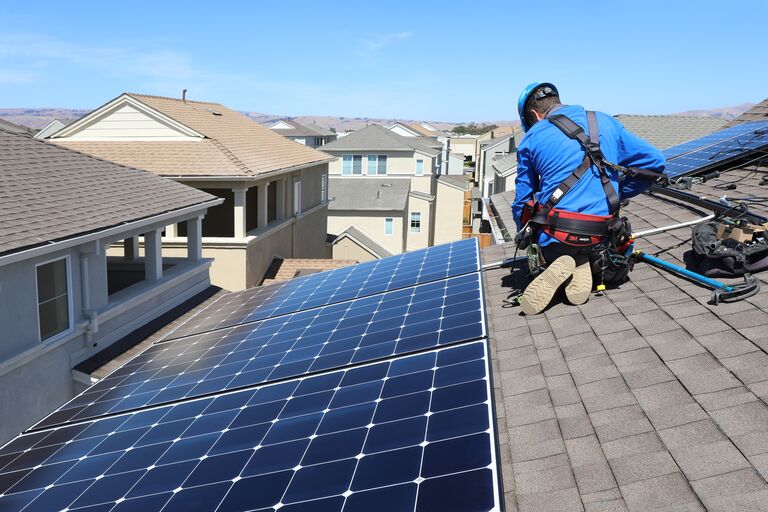How to Pick the Right Solar Energy Installation for Your Power Needs
Choosing a proper solar power installment requires a methodical strategy that starts with a clear understanding of your power intake patterns and anticipated future demands. Factors such as the kind of solar technology, installment prices, and available motivations play pivotal functions in making a notified choice - solar photovoltaic. Additionally, the option of a qualified installer can not be neglected, as their know-how can significantly influence the performance and durability of your system. As you consider these factors to consider, you might discover that the ideal path is not always the most obvious one.
Assess Your Power Demands
Analyzing your power needs is an important first step in the solar energy installment process. Comprehending your current and future energy consumption will certainly lead the layout of an effective planetary system customized to your requirements. Beginning by examining your energy costs from the past year to establish your average monthly power usage, commonly determined in kilowatt-hours (kWh) This information will certainly offer a structure for computing the size of the solar system you might need.
Take into consideration seasonal variants in energy consumption, as specific months might require even more power due to heating or cooling requirements. Additionally, assess any type of organized changes in way of life or property, such as the acquisition of electric vehicles or home expansions, which may boost your power needs in the future.
As soon as you have a detailed understanding of your power consumption, you can establish the proper solar capacity required to meet those requirements. This analysis not just aids in sizing the solar installment however likewise educates choices about energy storage space options and prospective grid connection requirements. solar photovoltaic. Inevitably, precisely gauging your energy needs makes certain that your solar power system operates successfully, providing the advantages of eco-friendly energy abreast with your consumption patterns

Evaluate Solar Technology Options
When taking into consideration a solar power setup, it is vital to review the various solar innovation alternatives readily available to ensure the system straightens with your energy needs and budget plan. The main modern technologies consist of monocrystalline, polycrystalline, and thin-film solar panels, each offering distinctive advantages and disadvantages.
Monocrystalline panels are known for their high performance and efficiency in limited room, making them appropriate for residential installations with much less roof covering area. They have a tendency to be more pricey. Polycrystalline panels, while somewhat much less effective, are typically extra affordable and can be an excellent option for larger installations where area is not a restriction. Thin-film solar panels are lightweight and adaptable, optimal for non-traditional surfaces, but they typically have lower effectiveness and require even more area to generate the same power result.
Along with panel kinds, take into consideration solar inverters, which transform the straight current created by the panels into alternating existing for home use. String inverters, microinverters, and power optimizers each have distinct benefits that can influence system efficiency. Examining these options will certainly aid you make an informed decision that fulfills your power needs successfully.
Consider Installation Prices
Comprehending installment costs is vital for anyone thinking about a solar power system. These costs can differ considerably based on a number of aspects, consisting of system dimension, kind of panels, and setup intricacy. A common household solar click for source installment might range from $15,000 to $30,000 prior to motivations, which can be a significant ahead of time financial investment.
To properly evaluate installment prices, it is important to here are the findings acquire detailed quotes from multiple solar suppliers. These quotes ought to damage down the costs of devices, labor, allows, and any additional devices needed for the installment. Pay close attention to the top quality of products being used, as higher-quality panels and inverters can lead to far better efficiency and durability, possibly offsetting greater preliminary costs.
In addition, take into consideration the long-term ramifications of installment costs. A more affordable installment may save cash in advance yet might bring about greater maintenance expenses or decreased power production with time. It is also recommended to evaluate funding alternatives, such as solar finances or leases, which can affect your overall financial dedication.
Research Study Citizen Rewards
Exploring regional incentives can significantly affect the overall cost of a solar energy installment. Lots of areas use a variety of monetary motivations focused on promoting renewable resource use, making solar energy extra accessible and budget-friendly for house owners and organizations alike.
These motivations may include federal tax obligation credits, state discounts, and neighborhood energy firm programs that offer cash incentives or web metering options. The Federal Investment Tax Obligation Credit Report (ITC) allows you to subtract a considerable percent of your solar installation expenses from your federal tax obligations. State-specific rewards can even more enhance these cost savings, typically in the kind of direct cash money rebates or tax obligation credit reports.
Additionally, some neighborhood federal governments might provide real estate tax exceptions for solar installments, making certain my website that your investment does not increase your residential or commercial property tax responsibility. Looking into these motivations can reveal significant savings, which can affect your choice on the dimension and kind of planetary system to set up.

Select a Respectable Installer
Choosing a reputable installer is vital to making sure the success and durability of your solar power system. The installation process substantially impacts the performance and performance of your solar panels, making it necessary to pick a contractor with a tried and tested track record. Begin by looking into local installers with on-line reviews and testimonials. Internet sites such as the Better Business Bureau can provide insight into consumer satisfaction and solution dependability.
Next, verify the installer's credentials, including licenses, qualifications, and insurance coverage. A trusted installer must hold qualifications from acknowledged organizations, such as the North American Board of Certified Energy Experts (NABCEP), indicating a high degree of know-how. Additionally, ask about the installer's experience with comparable jobs, especially in your area, as regional environment and guidelines can affect installment methods.
Demand numerous quotes and compare them not only on rate yet likewise on the top quality of tools and service warranties used. A trustworthy installer ought to offer clear info concerning their product or services, assisting you make an informed decision. By spending time in picking a trusted installer, you will certainly enhance the overall effectiveness and longevity of your solar power system.
Final Thought
In conclusion, selecting the proper solar energy setup necessitates an extensive examination of power requirements, an understanding of offered solar modern technologies, and a careful factor to consider of installment expenses. Examining regional motivations can enhance monetary advantages, while picking a trustworthy installer guarantees high quality craftsmanship and reliability. solar photovoltaic. By carefully evaluating these factors, individuals can achieve an optimum solar option that meets both current and future power needs, ultimately contributing to lasting power practices and expense financial savings over time